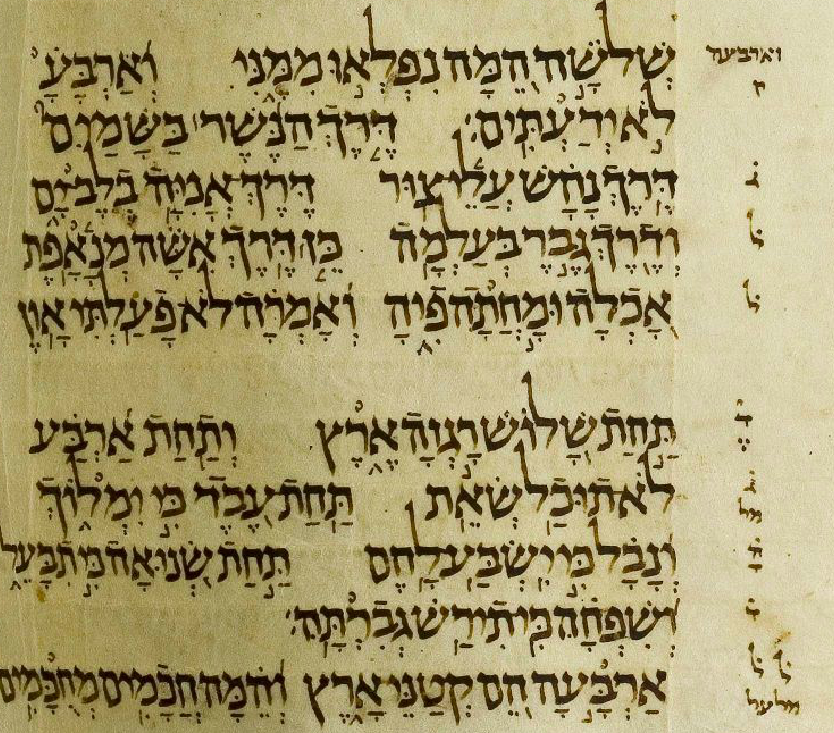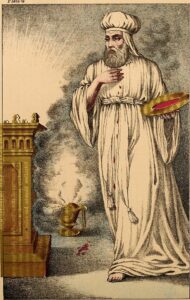The weekday yotsrot of the Cairo Geniza have a structure quite different from normative Ashkenazi festival yotsrot, and much closer to that of Ashkenazi maaravot. There are no yotser or ofan piyyutim — each blessing has a stanza of an extended, unified poem before its ḥatimah, and the only stanzas inserted into the guf ha-berakha are in the final blessing, surrounding the Mi Khamokha. They’re also generally much shorter and more user-friendly than the complex and intricate mysticism of Ashkenazi festival yotzrot.
This cycle is written in an alphabetical acrostic, followed by the author tag “Isaac the priest and poet, be strong.”
Note: “The CAUSE” is used to translate the Divine Name YHVH, based on the philosophical idea of God as the Prime Mover and on the interpretation of the Name as a causative form of the copula – “causes to be.” This translation also uses the plural pronouns They/Their/Them to refer to God as a pluralis majestatis, and to avoid the implications of God being assigned a gender. (Find Ibn Ezra’s commentary on Genesis 1:1 for a discussion of the pluralis majestatis when referring to God.) All divine referents (pronouns, epithets, names) are rendered in unicase.
| Source (Hebrew) | Translation (English) |
|---|---|
בָּרוּךְ אַתָּה יְהֹוָה אֱלֹהֵֽינוּ מֶֽלֶךְ הָעוֹלָם יוֹצֵ֥ר אוֹר֙ וּבוֹרֵ֣א חֹ֔שֶׁךְ… עד …וְנִזְכֶּה כֻלָּֽנוּ מְהֵרָה לְאוֹרוֹ׃ |
Blessed are You, Cause our God, Sovereign of the Universe, who makes light and creates darkness… until …and we will all merit speedily its light. |
רָצִ֣יתָ אֶת־הָעָם לְהִטָּהֵר מִפֶּֽשַׁע בִּמְקוֹם אַשְׁמָה יֹֽשֶׁר צֶֽדֶק חֵֽלֶף רֶֽשַׁע בְּיוֹם שִׂמְחַת כֹּהֵן גָּמַֽרְתָּ וְחָתַֽמְתָּ תְּשׁוּבוֹת תֵּֽשַׁע דּוּן־נָא בְּחַסְדְּךָ לְהָבִיא אֶת־אוֹר הַיֶּֽשַׁע |
You desired[1] The first word of each stanza derives from Psalm 85:2. Psalm 85 is the traditional psalm recited for Yom Simḥat Kohen in the Bene Israel community of Mumbai. the people to be purified from sin. In place of guilt, uprightness, righteousness in lieu of evil. On the day of the priest’s rejoicing, You finished and sealed nine repentances.[2] The days of repentance, not including Yom Kippur, the day of sealing. Judge, please, in Your mercy, to bring the light of salvation. |
בָּרוּךְ אַתָּה יְהֹוָה יוֹצֵר הַמְּאוֹרוֹת׃ אַהֲבָה רַבָּה אֲהַבְתָּנוּ… עד …וּלְיַחֶדְךָ בְּאַהֲבָה׃ |
Blessed are You, Cause, who makes the luminaries. Great love You have loved us… until …and to unify You in love. |
יְהֹוָ֣ה הַיּוֹם נַחֲזֹר לִקְרִיאַת שְׁמֶֽךָ וְנִשְׂמַח כִּי מָחַֽלְתָּ כִּפַּֽרְתְּ עַל־עַמֶּֽךָ בְּיוֹם שֵׁם הָאֵל זׇכְרֵֽנוּ־נָא בְּרַחֲמֶֽיךָ חֲמֹל עָלֵֽינוּ בְּחֶמְלָה וְאַהֲבַת עוֹלָמֶֽךָ |
Cause, today we will return to calling Your name,[3] The day after Yom Kippur, all the places in the liturgy where we say ha-Melekh during the Ten Days return to being ha-El. Thus the traditional Ashkenazi term for the day, “The Day of God’s Name” — Yom Shem ha-El, or Gott’s Nomen Tag in Yiddish. and rejoice, for You forgave and atoned for Your people. On the day of God’s Name, remember us, please, in Your compassion — Have mercy on us in mercy and Your eternal love. |
בָּרוּךְ אַתָּה יְהֹוָה הַבּוֹחֵר בְּעַמּוֹ יִשְׂרָאֵל בְּאַהֲבָה׃ שְׁמַ֖ע… עד …אֱמֶת… עד …לְךָ עָנוּ שִׁירָה׃ |
Blessed are You, Cause, who chooses Their people Israel in love. Hear… until …true… until …to You answered in song. |
אַרְצֶ֑ךָ טִהַֽרְתָּ מִטֻּמְאַת אָשָׁם יֵשׁ הִנְחַֽלְתָּ לְאוֹהֲבֶֽיךָ וְיֻגְשַׁם בְּיוֹם שִׂמְחַת כֹּהֵן כָּתוּב יְהִי וְנִרְשַׁם לָכֵן נָשִֽׁירָה כׇּל־מָה שֶׁהוּשַׁר שָׁם׃ |
Your land You purified from the impurity of guilt. Substance You bequeathed Your lovers[4] A reference to Proverbs 8:21. The rabbis famously interpret the word yesh (“substance”) by its gematria interpretation of 310 and claim (Mishnah Oktzin 3:12) that every righteous person will inherit 310 worlds in the World to Come. and it wil be fulfilled. On the day of the priest’s rejoicing, may it be written and sealed. Thus we will sing what was sung there.[5] i.e. at the shore of the sea. |
בְּגִילָה בְּרִנָּה בְּשִׂמְחָה רַבָּה וְאָמְרוּ כֻלָּם מִֽי־כָמֹ֤כָה בָּֽאֵלִם֙ יְהֹוָ֔ה מִ֥י כָּמֹ֖כָה נֶאְדָּ֣ר בַּקֹּ֑דֶשׁ נוֹרָ֥א תְהִלֹּ֖ת עֹ֥שֵׂה פֶֽלֶא׃ שִׁירָה חֲדָשָׁה שִׁבְּחוּ גְאוּלִים לְשִׁמְךָ עַל־שְׂפַת הַיָּם׃ |
In glee, cheer, great joy, and they all said: Who is like You among deities, Cause? Who is like You, awesome in holiness, terrific in praise, wonder-doing? A new song the redeemed lauded Your name by the seashore. |
שַׁ֝֗בְתָּ מִמַּלְכוּתְךָ לֵאלֹהוּתְךָ בְּיוֹם זֶה נֹאמַר אֶת־שִׁמְךָ לְפִי קְדֻשָּׁתְךָ בְּיוֹם זֶה בְּיוֹם שֵׁם הָאֵל סֶֽלָה וָעֶד נְזַמֵּר תְּהִלָּתְךָ בְּיוֹם זֶה עֵת רְקֹד בָּאָה נִרְקֹד בְּסֻכָּתְךָ בְּיוֹם זֶה וּבְיוֹם שִׂמְחַת כֹּהֵן פֵּרְשׁוּ הַחֲכָמִים בְּמִשְׁנָתְךָ בְּיוֹם זֶה צָהַל הַכֹּהֵן בַּעֲבוֹדָתְךָ בְּיוֹם זֶה |
You returned from Your sovereignty to divinity on this day. We will say Your name per Your holiness on this day. On the day of God’s Name, forever and aye we will hymn Your praise on this day. Dance-time[6] See Ecclesiastes 3:4. This line introduces the concept of preparation for Sukkot. has come! We’ll dance in Your shelter on this day. And on the day of the priest’s rejoicing, the sages explained in Your Mishnah[7] Specifically meaning Mishnah Yoma 7:4, the source for the entire concept of Yom Simḥat Kohen. on this day, the priest celebrated in Your work on this day. |
שְׁבִ֣ית קְדוֹשֶֽׁיךָ תְּקַבֵּץ בִּמְהֵרָה רָאשֵֽׁינוּ נוֹטִים הָהָֽרָה בְּיוֹם שִׂמְחַת כֹּהֵן שָׁעָה שֶׁיָּצָא מִן־הַקֹּדֶשׁ בִּטְהֹרָה תְּמִימִים וּקְדֹשִׁים שָׂמְחוּ אִתּוֹ בְּזִמְרָה וּבְיוֹם שֵׁם הָאֵל יֹֽׄשֶׁר צֶֽׄדֶק לִמַּֽדְתָּ לְכׇל־נִבְרָא חַׄסְדְּךָ קָׄרָֽאנוּ בְּפָרָשַׁת הַשִּׁירָה׃ |
The exile of Your holy ones You will gather speedily. Our heads tilt Mountainwards. On the day of the priest’s rejoicing, when he went out from the Holy Place in purity,[8] A nearly direct citation of Mishnah Yoma 7:4 the innocent and holy rejoiced with him in hymning. And on the day of God’s Name, righteous justice You taught to all creation. Your mercy we read in the portion of the Song. |
זֶה צוּר יִשָּׁעֵנוּ פָּצוֹ פֶּה וְאָמְרוּ יְהֹוָ֥ה ׀ יִמְלֹ֖ךְ לְעֹלָ֥ם וָעֶֽד׃ צוּר יִשְׂרָאֵל קֽוּמָה לְעֶזְרַת יִשְׂרָאֵל וּפְדֵה כִנְאֻמֶֽךָ יְהוּדָה וְיִשְׂרָאֵל גֹּאֲלֵ֕נוּ יְהֹוָ֥ה צְבָא֖וֹת שְׁמ֑וֹ קְד֖וֹשׁ יִשְׂרָאֵֽל׃ |
This is the Rock of our salvation! They opened their mouth and said: The Cause will reign forever and ever! Rock of Israel, arise to help Israel, and redeem — as You declared — Judah and Israel. Our Redeemer, the Cause of Multitudes named, the Holy One of Israel. |
יַעֲקֹֽב הִׄתְאַמֵּץ כִּׄי יִזְכׇּרְךָ הָאֵל הִׄנֵּה נְׄאֻם יְהֹוָה יָמִים בָּאִים שֶׁתִּגָּאֵל בְּיוֹם שִׂמְחַת כֹּהֵן וְׄגַם הׄוּא יוֹם שֵׁם הָאֵל פֵּׄרוּשַֽׁיִם יֵׄשׁ לַיּוֹם תְּשׁוּבָתַֽיִם לְכׇל־שׁוֹאֵל וּבְיוֹם שֵׁם הָאֵל יׄוֹם טׄוֹב עָשָׂה הַמְּתַוֵּךְ בֵּינֵנוּ וָאֵל נָֽׄחוּ חַׄזָּנִים שֶׁקָּרְבוּ לִפְנֵי תֵּבַת אֵל זַׄמְּרוּ קְׄהִלּוֹתַי לְמוֹשִֽׁיעַ וּמָגֵן וּמֵבִיא גּוֹאֵל׃ |
Jacob, strengthen yourself, for God will remember you. Behold, quoth the Cause, days come that you will be redeemed. On the day of the priest’s rejoicing, which is also the day of God’s Name, Dual explanations[9] This line has two artificial dual forms. there are to the day, dual answers to all who ask. And on the day of God’s Name, the intercessor[10] Referring to the high priest. between us and God made a holiday. Cantors who came near before the ark of God rested.[11] In Ashkenazi practice, the day of 11 Tishrei was a cantorial holiday, since the cantor had done a lot of work for the yamim noraim. Hymn, my congregations, to the Savior and Shield bringing a redeemer! |
בִּגְלַל אָבוֹת תּוֹשִֽיעַ בָנִים וְתָבִיא גְּאֻלָּה לִבְנֵי בְנֵיהֶם בָּרוּךְ אַתָּה יְהֹוָה צוּר יִשְׂרָאֵל וְגוֹאֲלוֹ׃ |
For the sake of the parents You will save the children, and bring redemption to their children’s children. Blessed are You, Cause, who redeemed Israel. |
Notes
| 1 | The first word of each stanza derives from Psalm 85:2. Psalm 85 is the traditional psalm recited for Yom Simḥat Kohen in the Bene Israel community of Mumbai. |
|---|---|
| 2 | The days of repentance, not including Yom Kippur, the day of sealing. |
| 3 | The day after Yom Kippur, all the places in the liturgy where we say ha-Melekh during the Ten Days return to being ha-El. Thus the traditional Ashkenazi term for the day, “The Day of God’s Name” — Yom Shem ha-El, or Gott’s Nomen Tag in Yiddish. |
| 4 | A reference to Proverbs 8:21. The rabbis famously interpret the word yesh (“substance”) by its gematria interpretation of 310 and claim (Mishnah Oktzin 3:12) that every righteous person will inherit 310 worlds in the World to Come. |
| 5 | i.e. at the shore of the sea. |
| 6 | See Ecclesiastes 3:4. This line introduces the concept of preparation for Sukkot. |
| 7 | Specifically meaning Mishnah Yoma 7:4, the source for the entire concept of Yom Simḥat Kohen. |
| 8 | A nearly direct citation of Mishnah Yoma 7:4 |
| 9 | This line has two artificial dual forms. |
| 10 | Referring to the high priest. |
| 11 | In Ashkenazi practice, the day of 11 Tishrei was a cantorial holiday, since the cantor had done a lot of work for the yamim noraim. |

“Yotsrot for Yom Simḥat Kohen/Yom Shem ha-El (11 Tishrei) in a Cairo Geniza weekday yotsrot style by Isaac Gantwerk Mayer” is shared through the Open Siddur Project with a Creative Commons Attribution-ShareAlike 4.0 International copyleft license.










Comments, Corrections, and Queries